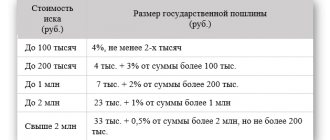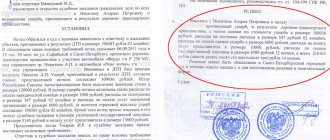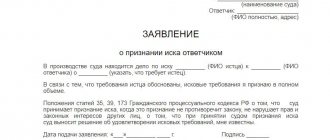Clarification of claims in court, article of the Code of Civil Procedure of the Russian Federation
When considering a case, the plaintiff often needs to clarify the claims, or change the grounds or subject of the claim. This may arise when the defendant files objections to the claim, as well as when clarification at the court hearing of circumstances that were not previously taken into account or unknown to the plaintiff.
A petition to clarify the claims is filed on the basis of Articles 35 and 39 of the Code of Civil Procedure of the Russian Federation, according to which the plaintiff has the right to file petitions, change the subject or grounds of the claim, and also clarify his demands against the defendants.
The right to file petitions 35 Code of Civil Procedure of the Russian Federation - Persons participating in the case have the right to file petitions, give explanations to the court orally and in writing; present your arguments on all issues arising during the trial. The right to clarify the claims Article 39 of the Code of Civil Procedure of the Russian Federation - The plaintiff has the right to change the basis or subject of the claim, increase or decrease the amount of the claim, or abandon the claim, the defendant has the right to admit the claim, the parties can end the case with an amicable agreement.
It is these articles of the Civil Code of the Russian Federation that the plaintiff will rely on when clarifying the claims. It is important for the plaintiff to understand what exactly the plaintiff wants to clarify.
How to make an application
The sample petition for reduction of claims has not been approved by law, so the applicant has the right to present it as he sees fit, in free form. The petition must contain the following information:
- the name of the judicial authority where it is submitted;
- composition of persons participating in the case;
- case number;
- initial claim volume, reduction amount and final amount;
- reason for the decline.
It is customary to include the following blocks in a sample application to reduce claims:
- A hat. It contains information about the court, the plaintiff and the defendant.
- The main part. It lists the basis and request for reduction of claims.
- Application. Here it is appropriate to list the documents that are attached to the application and that can serve as a basis.
- Date and signature.
What can be specified in a statement of claim in a civil court?
These are the components of the claim, which, in accordance with the law, are subject to clarification.
The subject of the claim is the substantive legal claim of the plaintiff against the defendant. Roughly speaking, this is what you want to get from the defendant in your claims.
The cause of action can be divided into two types:
Legal grounds - specific rules of law on the basis of which the plaintiff demands the court to satisfy his claims (for example, according to Article 810 of the Civil Code of the Russian Federation, the Borrower is obliged to return to the lender the received loan amount within the time frame and in the manner prescribed by the loan agreement)
Factual grounds are a set of legal facts on the basis of which the plaintiff considers himself to have the right to demand satisfaction of the claim from the court. (for example, lent money on a receipt, transferring funds to the defendant under an agreement, concluding the agreement itself, etc.).
A claim is a direct demand addressed to the court for satisfaction.
ATTENTION! Do not confuse a change in quantitative requirements with a change in the subject of the claim! An increase or decrease in an already stated claim will be a change in the claim. The addition of a new claim that was not previously stated and does not arise from the stated requirements is a change in the subject of the claim.
Sample petition to reduce the amount of state duty
To the Ordzhonikidze District Court of Yekaterinburg
Plaintiff:
Respondent:
Petition
on reducing the amount of state duty to court
The plaintiff filed a statement of claim demanding the collection of debt under the loan agreement.
In accordance with Art. 333.20 of the Tax Code of the Russian Federation: “courts of general jurisdiction or justices of the peace, based on the property status of the payer, have the right to reduce the amount of state duty payable in cases considered by these courts or justices of the peace, or to defer (in installments) its payment in the manner prescribed by Article 333.41 of this Code".
As the Constitutional Court of the Russian Federation indicated, the requirements of the procedural law for citizens' appeals to the court are mandatory. This also applies to the rules governing the procedure for paying state duty, since state duty refers to federal taxes (Article 13 of the Tax Code of the Russian Federation) and everyone is obliged to pay legally established taxes (Article 57 of the Constitution of the Russian Federation). At the same time, the Constitutional Court of the Russian Federation referred to its Determination No. 272-O dated June 13, 2006, which stated that the lack of an opportunity for an interested person - due to his property status - to fulfill this obligation should not prevent him from exercising the right to judicial protection, since otherwise it was contrary would be the Constitution of the Russian Federation. Taking this into account, Art. 333.36 of the Tax Code of the Russian Federation, a certain category of citizens is exempt from paying state duty in cases heard in courts of general jurisdiction and by magistrates, and clause 2 of Art. 333.20 of the Tax Code of the Russian Federation provides for a rule on reducing state duty or deferring its payment.
It is important to take into account that rules similar to modern rules on reducing the amount of state duty were known to Russian law back in the 19th century. Then there was an institution called the law of poverty, the essence of which was to reduce the amount of court fees on the basis of certification that a particular person had insufficient funds to conduct a case. This certificate was issued by the person’s official or public superiors or by a justice of the peace. In this case, the person was obliged to pay an additional fee as soon as his property situation changed for the better. Failure to fulfill this obligation entailed the application of penalties in the form of a fine and collection of underpaid amounts of duty.
Based on the property status of the Plaintiff, the lack of income sufficient to simultaneously pay the state fee and ensure the subsistence level of the Plaintiff and his child, who is in full-time education, I ask you to reduce the amount of the state fee payable.
Based on the aforesaid and guided by Article. 333.20 Tax Code of the Russian Federation
ASK:
- reduce the amount of state duty payable to the actual payment made.
Date, signature
How to submit a statement to the court to clarify the claims to the court?
It is better to make a request to clarify the claims in writing, indicating the parties and parts of the claim that you want to change or clarify.
The rules for drawing up a petition to clarify claims are similar to the rules for filing a claim - you also indicate the court to which you are filing, the full names of the parties to the process, what is changing and the reasons for the changes, signed by the party or representative by proxy.
The reasons for clarifying claims can be very diverse. The most common reasons for clarification of claims that occur in litigation are the following:
- “In connection with familiarization with the defendant’s objections, I consider it necessary to clarify the requirements in terms of...”
- “Having read the materials of the civil case and the documents presented by the defendants..”, I consider it necessary to clarify my claims in part...”
- “In connection with the voluntary fulfillment by the defendant of the plaintiff’s demands regarding the repayment of the debt, I consider it necessary to clarify the claims..”
IMPORTANT! According to Article 39 of the Code of Civil Procedure of the Russian Federation, if the refusal of demands or the conclusion of a settlement agreement violates the rights of third parties, the court will not accept it!
In the text of the letter, be sure to indicate what you want to change or add in accordance with Article 39 of the Code of Civil Procedure of the Russian Federation (clarification of claims). If you clarify the claim in part, then indicate in which part of the clarification; if you increase the claims of the claim, for example, in terms of penalties, then additionally provide the court with a new calculation of the claims.
Petition to reduce claims
Often during the consideration of a case in court, after filing a claim, it becomes necessary to clarify the claims in the form of:
This may concern both property requirements (for example, monetary ones, as well as everything that has a value expression) and non-property ones (about the elimination of obstacles, for example, those that cannot be identified with money). In such cases, the person who filed the claim submits a petition to reduce the claims to the court or draws up an application to reduce the claims. Similar documents are also submitted in cases where it is necessary to increase the claims.
Reasons why requirements are reduced:
- During the meeting, the circumstances of the case are clarified, from which it is clear that there is no need for certain requirements already stated.
- The defendant provides evidence from which it is clear that the violation of the plaintiff’s rights requires a different protection of rights than what was originally stated.
- Clarification of calculations. The law requires the party filing a claim to recover money to provide an estimate of the amounts. As a rule, interest, penalties, fines, etc. are collected simultaneously with the main debt, and therefore the calculations are impressive (in the case of deliveries, for example). In such situations, common calculation errors are possible. A petition to reduce claims is also made when part of the amounts is not supported by relevant evidence (payment orders, receipts, checks or the documents submitted in form and content do not comply with the law) or the defendant has proven the unfoundedness of part of the demands by providing evidence of proper payment of the debt for part of the amounts.
At the same time, the law does not provide for the obligation to reduce claims by filing an application, since in the absence of documents confirming the plaintiff’s claims, the court can independently decide either to refuse to satisfy the claim or to satisfy the requirements to the extent supported by the facts. But, as practice shows, the courts actually oblige the party to make clarifications in the claim, and the party itself is interested in filing an application to reduce the claims. In any case, writing a procedural document is a lawyer’s job, and the question of whether to reduce the requirements or not is an important one, a kind of strategy for the case that each lawyer chooses independently.
A sample petition to reduce claims is attached.
Based on the results of consideration of the application to reduce the requirements, the court may make a ruling or make a record of the existence of such an application.
This is important to know: Objection to clarify claims: sample
The petition can be downloaded from our website.
petitions (applications):
Form for clarification of claims (oral or written)?
The form for clarifying claims is not defined by law. In judicial practice, it is allowed to accept clarifications on a claim, both orally and in writing. The parties, in accordance with Article 35 of the Code of Civil Procedure of the Russian Federation, are free to submit petitions, both orally and in writing. The problem here is that your clarification is recorded in the court hearing and in the case materials. Paper will be more reliable. In practice, the courts try in any case to take a written statement from the clarifying side. Waiver of demands only in writing.
It is recommended to submit clarifications of the statement of claim in writing; your statement will be attached to the case materials, and subsequently, the court will base its decision taking into account your request. The court will not be able to miss your clarification when studying the case materials when making a decision.
If the situation at the court hearing is such that there is a need to verbally clarify the requirements or grounds, it is recommended to additionally use the rule of law part 2. Art. 230 of the Code of Civil Procedure of the Russian Federation and petition the court to include in the protocol information about the circumstances that they consider significant for the case.
The procedure for clarifying claims at a court hearing.
When can I submit clarification of claims? You can submit clarification of claims at any time during the meeting before the court leaves the deliberation room to make a decision.
However, this should not be abused at all and it is better to submit a clarified application in advance, through the court office or the GAS justice system, so that the court has the opportunity to familiarize itself with it before the court hearing.
Usually the judge at the beginning of the hearing asks if the parties have any motions in the case before the start of the trial. If it is necessary to clarify the claims, you need to stand up and file a petition to clarify the claims. The court puts this issue up for discussion between the parties and, taking into account the opinions of the parties, accepts a clarification of the claims or refuses to accept it, about which a ruling is made.
The law does not limit the plaintiff in the number of clarifications on the claim, the plaintiff can clarify his claims more than once, but be aware that this may delay the consideration of your claim, the court, when accepting a clarified statement of claim, provides time for the defendant to file objections, explains the burden of proof, and invites the parties to provide evidence .
You cannot abuse your rights in civil proceedings! The obligation to use their rights in good faith is imposed on the parties by the norm of Article 35 of the Code of Civil Procedure of the Russian Federation. This means that the plaintiff cannot abuse his right to clarify the claim in order to delay the consideration of the case, and if the plaintiff clearly abuses his rights, the court can simply refuse to accept the clarification.
The procedure for reducing the amount of state duty to court
The Constitutional Court of the Russian Federation has repeatedly stated in its conclusions that the lack of the opportunity for a person applying for judicial protection, due to his property status, to fulfill the obligation to pay the fee in full, should not prevent the exercise of his rights, since, if otherwise , there would be a violation of the provisions of the Constitution of the Russian Federation. In this connection, the possibility of reducing the payment when filing a claim is the best solution to the problem of temporary insolvency, regulated in modern legislation.
There is a way out of this situation - a petition to reduce the amount of the state duty; this procedural document must be drawn up and submitted simultaneously with the filing of the claim, so that the court accepts the application and resolves the issue with the petition aimed at reducing the state duty.
ATTENTION: watch the VIDEO with advice from a lawyer on reducing the state fee, installment payment, exemption from paying the mandatory state fee to the court. In addition, do not forget to subscribe to the YouTube channel to be able to receive legal advice in the comments to the video.







